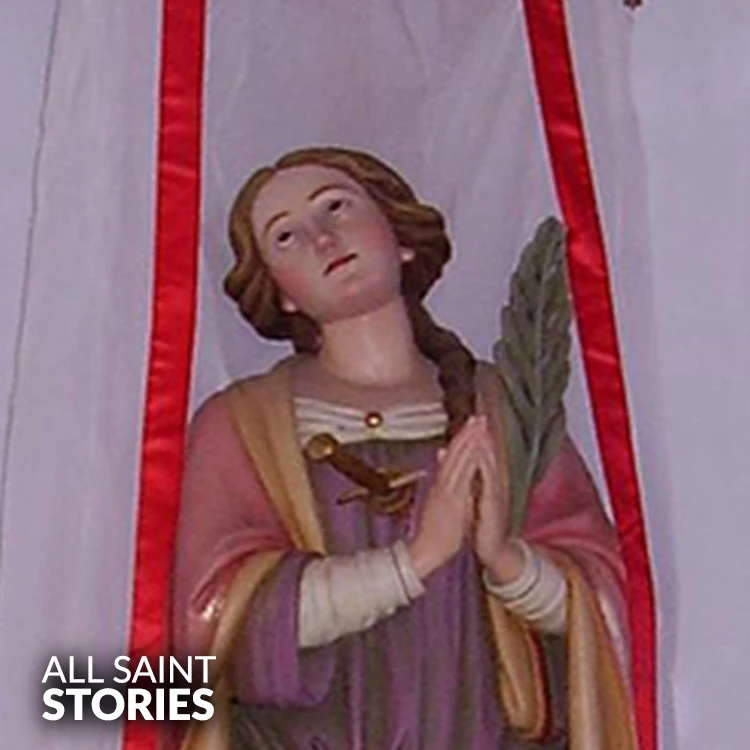O blessed St. Fusca, youthful witness of unwavering faith, intercede for us before God. May your courage strengthen our own hearts, and may your love for Christ ignite ours. Guide us in times of doubt and persecution, that we may remain steadfast in our journey toward holiness. Amen.
ST. FUSCA OF RAVENNA
ST. FUSCA OF RAVENNA

St. Fusca of Ravenna was a young Christian martyr from the 3rd century who, despite her youth, refused to renounce her faith during the Roman persecutions. Along with her nurse Maura, she suffered martyrdom for her steadfast belief in Christ and is venerated as a symbol of youthful courage in the Catholic tradition.
St. Fusca of Ravenna stands as one of the early Christian martyrs whose story reflects both the innocence of youth and the fierce conviction of unwavering faith. Born in Ravenna, Italy, during the 3rd century—a time when the Roman Empire was hostile to the spread of Christianity—Fusca's life would be marked by spiritual bravery that belied her tender age. Though little is known about her exact date of birth, her legacy has endured primarily through tradition and the veneration passed down through generations of Christians.
From a young age, Fusca showed an unusual devotion to the teachings of Christ, which placed her in direct conflict with the pagan culture dominant at the time. Her parents, reportedly of noble status and adherents to Roman religious customs, were opposed to her interest in Christianity. It is said that her decision to embrace the new faith was inspired and nurtured by her faithful nurse, Maura, who herself was a Christian convert. The bond between Fusca and Maura was one of deep spiritual kinship, and together they committed themselves fully to the path of discipleship.
When their conversion became known, they were arrested and brought before the Roman authorities. As with many early Christian martyrs, they were given opportunities to recant their faith and return to the worship of the Roman gods. However, Fusca, despite her youth, refused to deny Christ. This defiance enraged the local magistrates, and both she and Maura were subjected to torture. They endured their sufferings with a calm that astonished onlookers and inspired fellow believers. Ultimately, both were executed—likely by the sword or other common means of Roman execution at the time.
The precise location of Fusca’s burial is believed to be in or near Ravenna, and over time, a cult formed around her memory. She came to be venerated especially in northern Italy, and her feast day was set on February 13. Her story is often told alongside that of her nurse Maura, emphasizing themes of mentorship, loyalty, and steadfast faith. In iconography, St. Fusca is typically depicted as a young girl holding a palm branch—a symbol of martyrdom—and occasionally shown with Maura at her side.
Fusca was canonized pre-congregation, meaning she was recognized as a saint before the Catholic Church formalized its canonization process. Her story, preserved through oral tradition and written hagiographies, has been a source of inspiration particularly for the young and those facing adversity because of their beliefs. Though not as widely known today as some other saints, St. Fusca remains a powerful example of the strength of youthful devotion and the transformative influence of faith.
Video Not Found
The information on this website is compiled from various trusted sources. While we aim for accuracy, some details may be incomplete or contain discrepancies.
If you notice any errors or have additional information about this saint, please use the form on the left to share your suggestions. Your input helps us improve and maintain reliable content for everyone.
All submissions are reviewed carefully, and your personal details will remain confidential. Thank you for contributing to the accuracy and value of this resource.
Credits & Acknowledgments
- Anudina Visudhar (Malayalam) – Life of Saints for Everyday
by Msgr. Thomas Moothedan, M.A., D.D. - Saint Companions for Each Day
by A. J. M. Mausolfe & J. K. Mausolfe - US Catholic (Faith in Real Life) – Informational articles
- Wikipedia – General reference content and images
- Anastpaul.com – Saint images and reflections
- Pravachaka Sabdam (Malayalam) – Saint-related content and insights
We sincerely thank these authors and platforms for their valuable contributions. If we have unintentionally missed any attribution, please notify us, and we will make the correction promptly.
If you have any suggestion about ST. FUSCA OF RAVENNA
Your suggestion will help improve the information about this saint. Your details will not be disclosed anywhere.
© 2026 Copyright @ www.allsaintstories.com



 English
English
 Italian
Italian
 French
French
 Spanish
Spanish
 Malayalam
Malayalam
 Russian
Russian
 Korean
Korean
 Sinhala
Sinhala
 Japanese
Japanese
 Arabic
Arabic
 Portuguese
Portuguese
 Bantu
Bantu
 Greek
Greek
 German
German
 Dutch
Dutch
 Filipino
Filipino